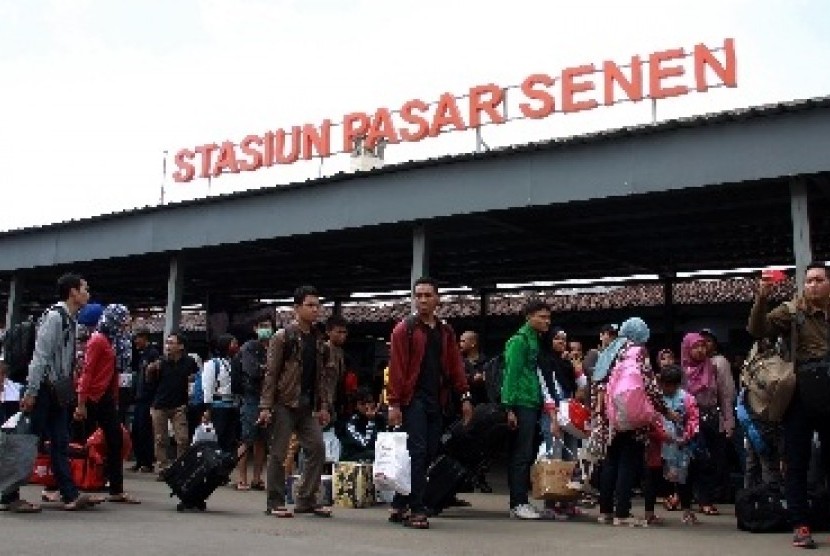REPUBLIKA.CO.ID, JAKARTA -- President Susilo Bambang Yudhoyono monitored the Senen Railway Station's services for the public on Thursday evening to assure the smoothness of transportation for post-fasting Idul Fitri or Lebaran travelers.
The president arrived at the Senen Railway Station at 3.45 pm and was welcomed by Ignasius Jonan, president director of state-owned PT Kreta Api Indonesia (KAI).
Ignasius explained to the president about the Lebaran transportation services by the PT Kreta Api Indonesia.
After being briefed, the president--who was accompanied by Vice President Boediono and a number of ministers such as Coordinating Minister for Political, Legal and Security Djoko Suyanto, Transportation Minister EE Mangindaan, Cabinet Minister Dipo Alam, and a number of other state officials--personally observed the process of PT Kareta Api Indonesia's services to the public.
KAI Spokesman Agus Komaruddin said on Wednesday that train passengers from the Senen Station had increased by up to 100 percent along the week in the face of the Idul Fitri holidays.
"On normal days, the percentage of passengers in 16 trains reached only 80 percent. Seats have always been filled in the run up to holidays, although we have added nine trains," he said.
He said that the Senen train station would witness about 18 thousand passengers per day in the run to the holidays, while on regular days the number of passengers per day was only about 9 thousand.
Transportation Minister AA Mangindaan said last week that his ministry had decided to add two trains for transporting post-fasting Idul Fitri travelers who are expected to increase this year.
The two trains had been ordered through state-owned railway company PT KAI from state-owned train industry PT INKA, the minister said.
"Five trains had been ordered from PT INKA, but the delivery of two has been hastened to transport Idul Fitri holiday makers this year," Mingindaan explained.
He said that the two trains consisted of 32 carriages, with a total capacity of two thousand passengers. "The trains have been painted and are now ready for use," the minister pointed out.
The minister, however, could not guarantee the availability of tickets until next Monday because express train tickets had been sold out both by online and in counters.
"Now, trains have imposed the policy of one ticket per seat. So, all passengers will receive seats. If the seats are full, then it means that tickets have been sold out," the minister stated.
Mangindaan said that the public preferred to use trains because trains were more convenient compared with buses, and train tickets were far more cheaper than airplane tickets.
"The public prefer trains more than other modes of transportation because they can relatively arrive at the destination on time, while the tickets are cheaper though the destinations are farther," the minister remarked.
Director General of Land Transportation at the Ministry of Transportation, Suroyo Alimoeso, predicted that during this year's Idul Fitri holidays the number of homebound travelers, excluding those traveling in their own vehicles, will increase by about 3.83 percent to 19.30 million over 2013, which saw 18.59 million travelers.
Taken together with those using private vehicles, totaling 4.16 million, the number of Idul Fitri travelers this year will account for about 24 million.
According to the director general, 5.59 million passengers were expected to use land transportation services, including 4.49 million traveling by trains, 4.10 million traveling by airplanes, 3.54 million opting for inland waterway transportation (ASDP) services, and 1.57 million traveling by ships.


